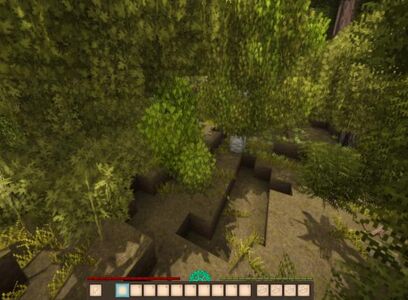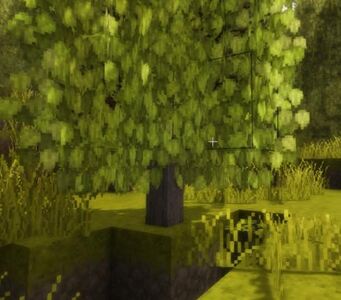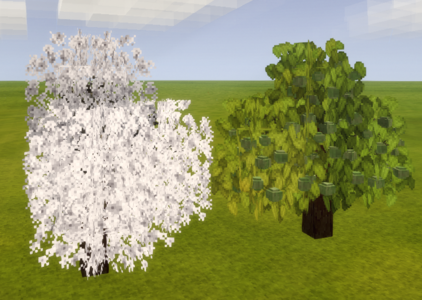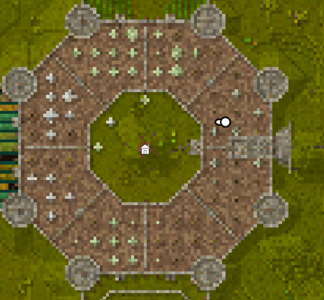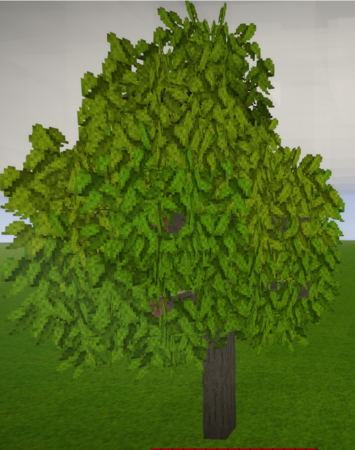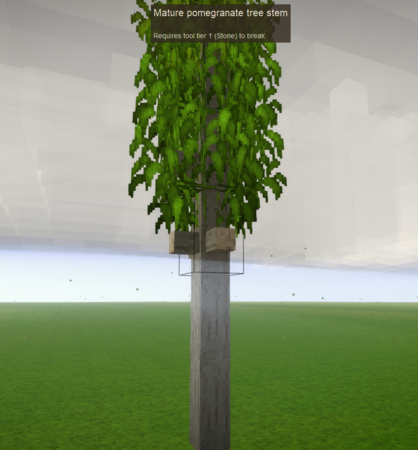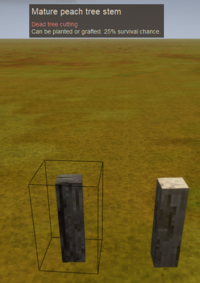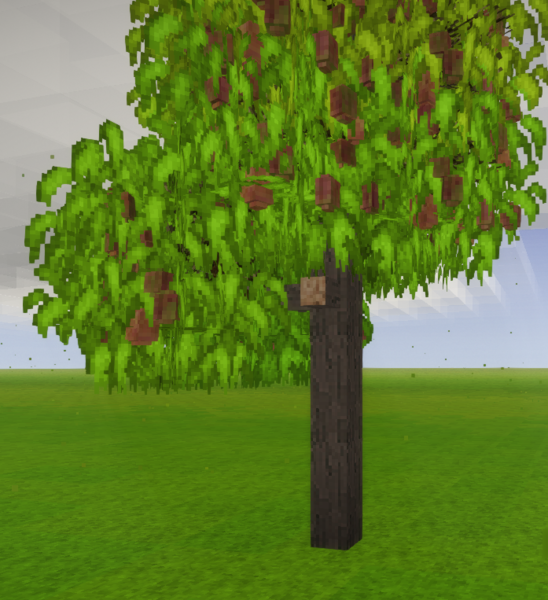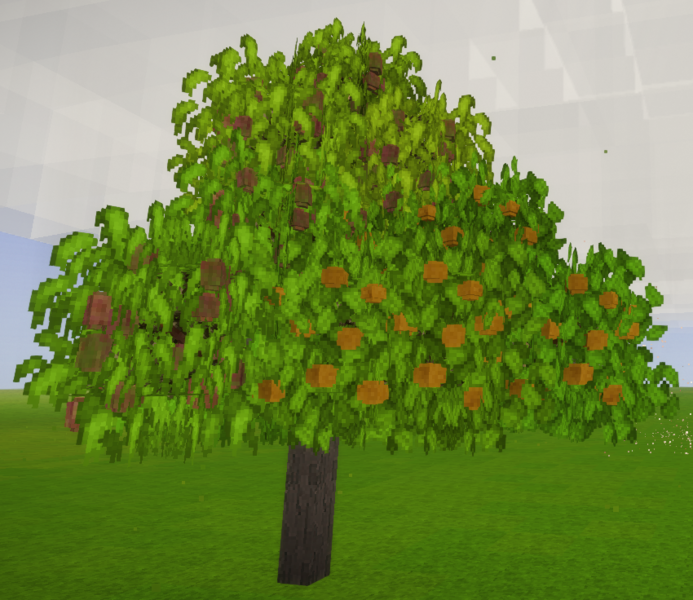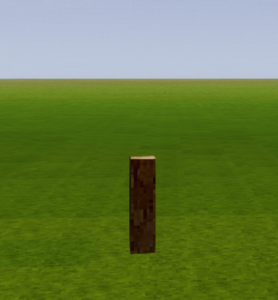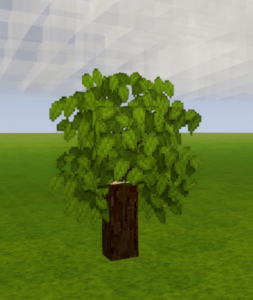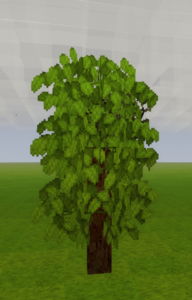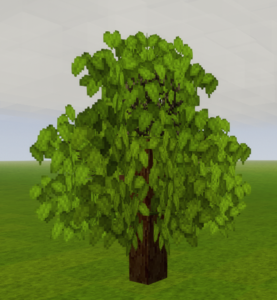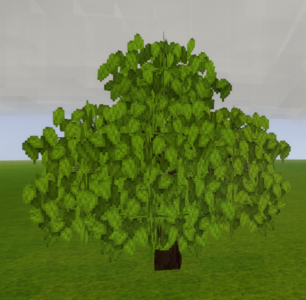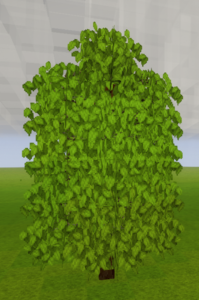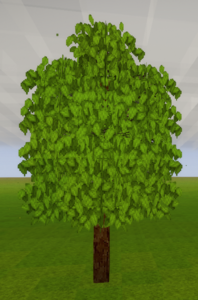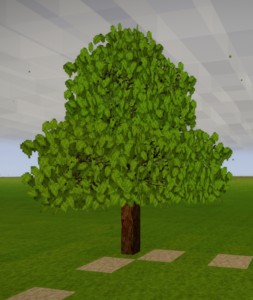Árboles frutales
Los árboles frutales son un tipo distinto de árbol que crece en el mundo. Su follaje cambia con la estación como el de los árboles normales, pero además pasan por 5 etapas distintas, desde la inactividad hasta la maduración de los frutos. Sus frutos pueden ser cosechados por el jugador para comer o pueden ser prensados en zumo y elaborados en bebidas alcohólicas.
Encontrar árboles frutales
Encontrar árboles frutales en la naturaleza puede ser un poco difícil, a menos que estén en su fase de floración. Al tratarse básicamente de un tipo diferente de árbol, puede ser difícil encontrarlos en un bosque. Sin embargo, utilizan diferentes patrones de bloques de hojas y colores en comparación con los árboles normales. Sin embargo, el mejor distintivo de un árbol frutal es su tronco, ya que es notablemente más delgado que el tronco en bloque de un árbol normal.
Las distintas especies de árboles frutales requieren temperaturas y precipitaciones diferentes para aparecer en la generación del mundo, por lo que pueden encontrarse en climas diferentes. Tenga en cuenta que esto no tiene en cuenta las temperaturas extremas que pueden alcanzarse en verano o invierno, sino que depende de la temperatura media anual. Esta temperatura puede mostrarse utilizando el comando /wgem pos climate. - se requieren derechos de administrador.
| Species | Min Temp | Max Temp | Min Rain | Max Rain |
|---|---|---|---|---|
| Red Apple | -5 | 18 | 0.5 | 1 |
| Pink Apple | -9 | 18 | 0.5 | 0.9 |
| Yellow Apple | 0 | 22 | 0.6 | 1 |
| Peach | 10 | 17 | 0.55 | 1 |
| Pear | -10 | 19 | 0.5 | 1 |
| Cherry | 0 | 24 | 0.6 | 1 |
| Orange | 25 | 30 | 0.45 | 1 |
| Olive | 22 | 50 | 0.3 | 0.5 |
| Mango | 28 | 50 | 0.6 | 1 |
| Breadfruit | 28 | 50 | 0.6 | 1 |
| Lychee | 22 | 50 | 0.6 | 1 |
| Pomegranate | 22 | 50 | 0.3 | 0.7 |
Collecting Fruit Tree Cuttings
Cuttings can only be acquired from the branch parts of a fruit tree, and will give 1 cutting for each branch part. They can only be broken with an axe.
A fruit tree consists of three different block types: tree stem, tree branch and tree leaves. While the stem only drops 3-7 firewood and the leaves do not drop anything when broken - unless they currently carry ripe fruit - only the tree branch blocks will drop fruit tree cuttings.
Fruit tree branches that are cut off from a fruit tree to obtain a cutting, will now re-grow a new branch over a long period of time (around one year).
Growing Fruit Trees
Fruit tree cuttings can either be planted in the ground for the chance of a completely new tree, or grafted onto an existing fruit tree. The chances for a cutting taking root and growing up is 40%, whereas a graft working out has a 50 % chance.
However, even if the cutting would take root, it can only do so if the temperature is accommodating for this specific fruit tree species.
The temperature under which a fruit tree will die can vary randomly within a certain amount, however one end of this temperature zone will be favoured. In the below list, the most likely temperature is shown first, with the full possibilities in brackets behind. Similarly, a fruit tree will go into dormancy under specific temperatures, which means even if it does not die, it will not be producing any fruit.
In the event that the tree survives and takes root, the temperatures need to stay within a certain range for an amount of time, for the tree to be able to flower - this is inspired by real life Vernalization.
That means, for a tree to flower, it needs to be exposed to the cold for a while and then experience a warm day. More specifically it needs to be exposed to temperatures above the die-below temperature but below 1.5 to 2.5 degrees (Vernalization Temp) for 220 to 280 in-game hours (Vernalization Time). It will then flower once the ambient temperature goes above 14 to 24 °C again.
| Species | Die-Below Temp | Vernalization Temp | Min Vernalization Time (Hours) | Enter Dormancy Temp | Leave Dormancy Temp |
|---|---|---|---|---|---|
| Red Apple | -28 (-38 - -28) | 1.5 - 2.5 | 220 - 280 | -3 (-7 - 1) | 19 (14 - 24) |
| Pink Apple | -24 (-34 - -24) | 1.5 - 2.5 | 220 - 280 | -3 (-7 - 1) | 19 (14 - 24) |
| Yellow Apple | -22 (-32 - -22) | 1.5 - 2.5 | 220 - 280 | -3 (-7 - 1) | 19 (14 - 24) |
| Peach | -12 (-22 - -12) | 1.5 - 2.5 | 220 - 280 | -3 (-7 - 1) | 19 (14 - 24) |
| Pear | -28 (-41 - -28) | 1.5 - 2.5 | 220 - 280 | -3 (-7 - 1) | 19 (14 - 24) |
| Cherry | -20 (-30 - -20) | 1.5 - 2.5 | 220 - 280 | -3 (-7 - 1) | 19 (14 - 24) |
The following six tree species count as evergreen trees, therefore they do not have a specific flowering requirement, but are susceptible to low temperatures.
Please keep in mind that all information given may still change as fruit trees are currently still under development - specifically the given die-below and loose-leave temperatures given here are not final yet.
| Species | Die-Below Temp | Lose Leaves Below Temp | Blossoming Time? |
|---|---|---|---|
| Orange | 6 (1 - 6) | 3 (-1 - 3) | |
| Olive | 7 (2 - 7) | 0 (-4 - 0) | |
| Mango | 10 (6 - 10) | 3 (-1 - 3) | |
| Breadfruit | 10 (6 - 10) | 12 (8 - 12) | |
| Lychee | 10 (6 - 10) | 12 (8 - 12) | |
| Pomegranate | 10 (6 - 10) | 12 (8 - 12) |
Al plantar una estaca de árbol frutal directamente en el suelo, cada estaca tiene un 40% de posibilidades de enraizar. Sin embargo, si se plantan fuera de su zona de confort térmico, donde las temperaturas invernales caen por debajo de su temperatura mínima de muerte, no enraizarán pase lo que pase, o puede que crezcan sólo para morir durante el invierno. Se recomienda comprobar la temperatura durante el invierno -y específicamente por la noche- antes de plantar cualquier árbol frutal, para asegurarse de que la temperatura más fría alcanzada no matará la especie de árbol frutal que el jugador está planeando plantar.
El suelo utilizado para plantar la estaca no influye en las posibilidades de supervivencia ni en la velocidad de crecimiento.
Grafting Fruit Trees
A fruit tree cutting can also be grafted to another, already grown fruit tree. However, this has some requirements and only a 50 % chance of success.
Firstly and obviously, grafting only works on another fruit tree. It also requires the host tree to have an "open cut", meaning the end of a branch block as shown below. The new cutting can then be added to the branch and will grow out up to 6 additional leaf blocks of the added cuttings type. When planning your orchard keep in mind that through grafting, the maximum range of a fruit tree can therefore extend - from the normal two blocks out to a maximum of three blocks out from the stem.
A grafted cutting, even if successful, does not completely integrate with the host tree. It will keep the temperature requirements of its own type, and every leaf block calculates these independently. This results in an important point to keep in mind when preparing and caring for a graft:
Do not attempt to graft fruit trees together that have highly differing temperature requirements. In the best case scenario it would simply look silly, as the different parts of the tree would very likely circle through the flowering and fruiting at different times - in the worst case scenario however it would not work out in the first place or the tree would have a permanently dormant branch.
Invernadero
Los árboles frutales pueden plantarse en invernaderos, pero el efecto de +5°C sólo se aplicará a la temperatura de vernalización. La temperatura de "muerte por debajo de" no se verá afectada.
Dado que un árbol frutal crecerá exactamente 6 bloques de altura y puede, sin injertar, tener hasta 5 bloques de anchura -hasta 2 alejados del tallo-, sólo se puede alojar un árbol frutal en cada invernadero.
Growth Stages
Fruit trees will go through several stages of growth until they reach their maximum height of 6 (possibly 8) blocks and maximum width of 5 blocks. Growth stages and the time between them are the same for all fruit tree species. They will simultaneously go through their seasonal changes as well, however those two do not influence each other - as long as the fruit tree has leaf and/or branch blocks, those can flower and bear fruit. However, leaf blocks that have not flowered and only grow while the rest of the tree is already in the fruiting or ripe phase will not adapt to the same seasonal stage and instead stay plain.
It takes on average 8 days until the next growth stage is reached, however it can - very rarely - take less or more time, from 6 to a maximum of 10 days.
A growth stage can either be an upwards or sideways growth. This means the tree will cycle through growing one block taller and then adding additional leaf blocks until the full "volume" for the current height is reached. The last few growth stages are different from this cycle, since once the tree has reached its maximum height, it will instead concentrate on only growing sideways until it has again filled its maximum "volume".
It is important to not that fruit trees may go through these stages differently - the red apple tree used in the below example went through a total of 14-16 stages (including growth of filler leaves) and gained the full possible volume. However, fruit trees may skip some of the four directions while growing or even end up in their maximum growth with one half having grown "stunted" - meaning a branch block missing and therefore not reaching the full possible width. They will however, without fail, all reach their maximum possible height.
Seasonal Changes
Different fruit tree species circle through the 5 different stages from dormant to ripe, following the seasons and each trees temperature requirements. Specifically the stages fruiting and ripe may be hard to spot for some species, it's recommended to enlarge the picture to get a better look.
The stages flowering, fruiting and ripe only stay for a certain amount of days - the block info tooltip for the leaf blocks will include a timer until the end of the current stage. This is especially important for the ripe stage, since the fruits will vanish after the end of the stage if they are not picked up in time.
| Tree | Length of Stage in days |
Dormant | Plain | Flowering | Fruiting | Ripe |
|---|---|---|---|---|---|---|
| Red Apple | Flowering: 3-6 Fruiting: 18 (18-39) Ripe: 12 (12-22) |
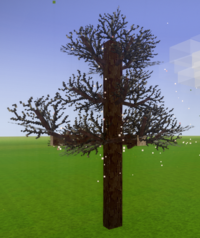
|
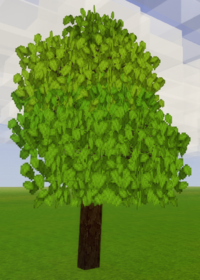
|
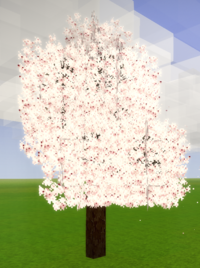
|
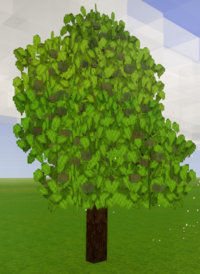
|
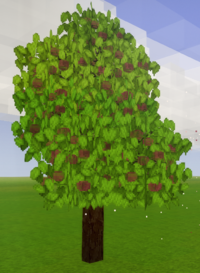
|
| Pink Apple | Flowering: 3-6 Fruiting: 21 (21-33) Ripe: 9 (9-19) |
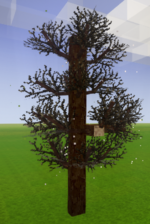
|
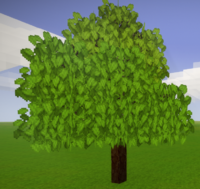
|
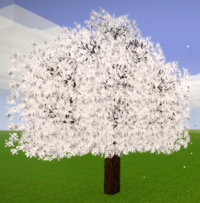
|
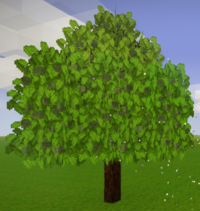
|
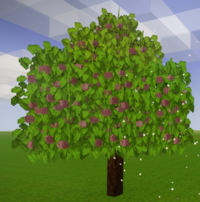
|
| Yellow Apple | Flowering: 3-6 Fruiting: 23 (23-35) Ripe: 10 (10-20) |
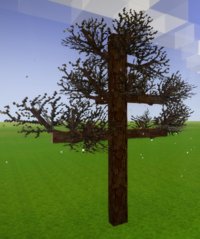
|
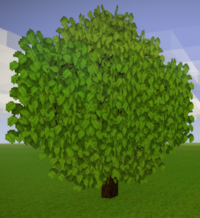
|
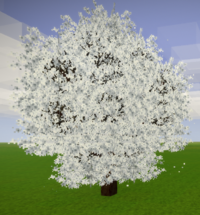
|
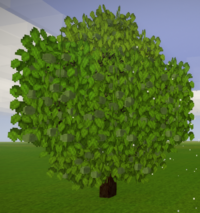
|
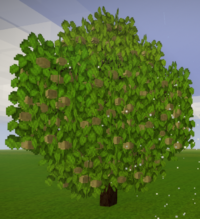
|
| Peach | Flowering: 3-6 Fruiting: 30 (30-42) Ripe: 8 (8-16) |
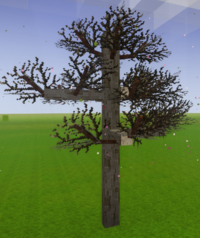
|
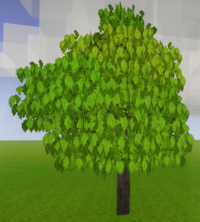
|
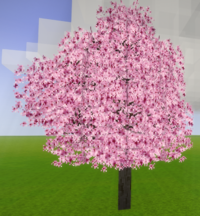
|
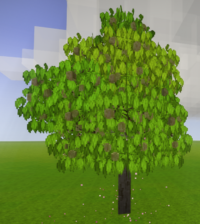
|
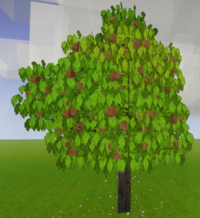
|
| Pear | Flowering: 3-6 Fruiting: 20 (20-32) Ripe: 28 (28-38) |
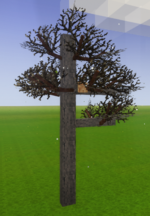
|
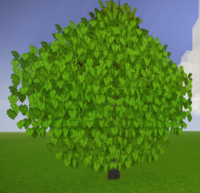
|
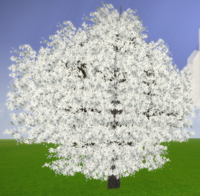
|
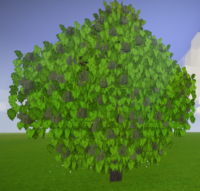
|
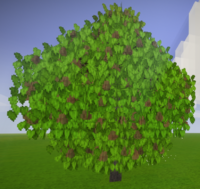
|
| Cherry | Flowering: 3-6 Fruiting: 11 (11-23) Ripe: 9 (9-19) |
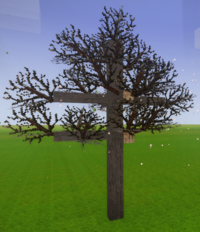
|
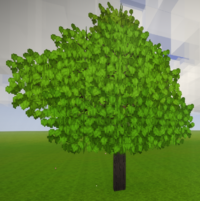
|
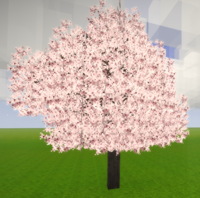
|
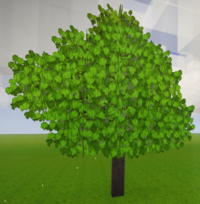
|
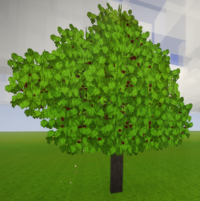
|
| Orange | Flowering: 3-6 Fruiting: 60 (60-72) Ripe: 12 (12-22) |
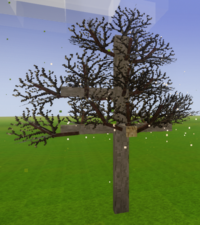
|
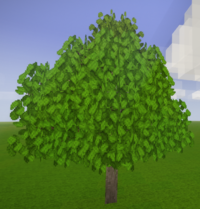
|
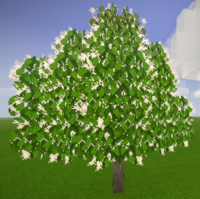
|
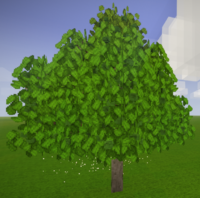
|
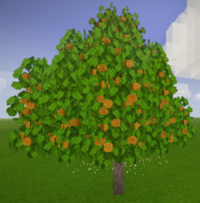
|
| Olive | Flowering: 3-6 Fruiting: 40 (40-52) Ripe: 24 (24-34) |
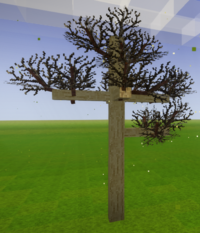
|
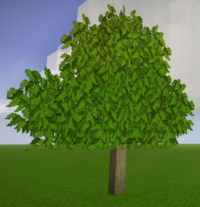
|
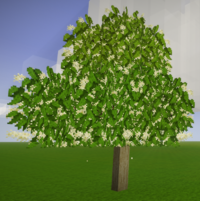
|
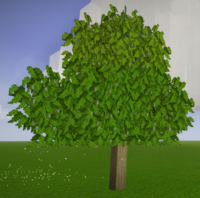
|
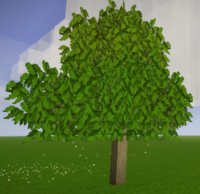
|
| Mango | Flowering: 3-6 Fruiting: 50 (50-62) Ripe: 10 (10-20) |
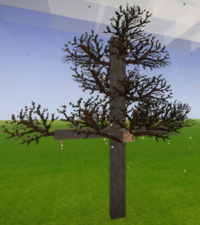
|
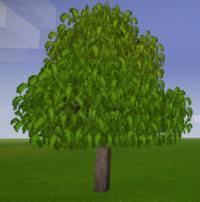
|
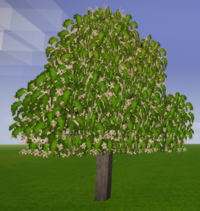
|
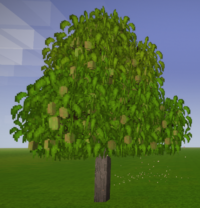
|
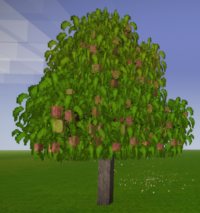
|
| Breadfruit | Flowering: 3-6 Fruiting: 50 (50-62) Ripe: 10 (10-20) |
- | 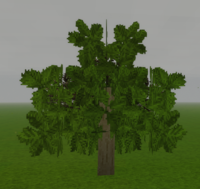
|
![Flowering Breadfruit Tree [1] Flowering Breadfruit Tree [1]](/images/thumb/3/3b/Breadfruit-Flowering.PNG/200px-Breadfruit-Flowering.PNG)
|
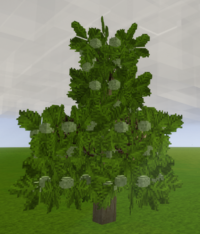
|
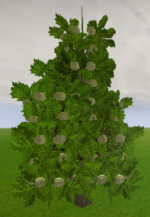
|
| Lychee | Flowering: 3-6 Fruiting: 50 (50-62) Ripe: 10 (10-20) |
- | 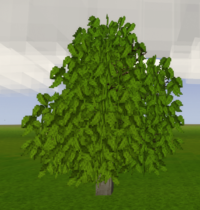
|
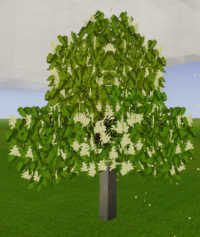
|
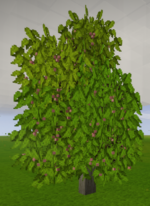
|
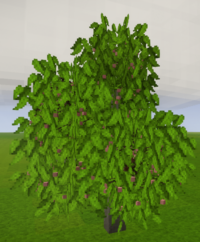
|
| Pomegranate | Flowering: 3-6 Fruiting: 50 (50-62) Ripe: 10 (10-20) |
- | 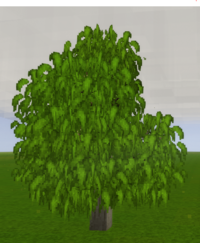
|
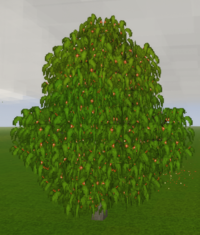
|
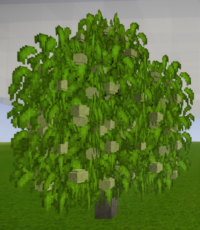
|
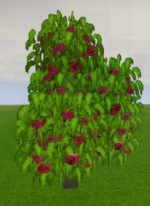
|
1 Unfortunately the flowering phase for this Breadfruit tree fell in between 3-4 am and was over before daylight. Will be changed with a better picture if possible.
Harvest
Fruit can be
harvested from the leaf blocks titled "with ripe fruit". A specified amount of fruits will be deposited directly into the inventory, leaving the plain leafs behind to go through the flowering cycle again. Harvesting fruit trees in this manner takes a little bit longer then harvesting a berry bush, the right button needs to be held down for about a full second. Leaf blocks ripe with fruit will also drop their fruit if broken, however as of now they do not grow back.
Each leaf block can be harvested for a randomized number of fruit, as shown below as Harvest Stack Size. The first number is the most likely outcome, however there is a low chance to gain more, as detailed in the brackets.
| Farming | |
|---|---|
| Wild foods | Berries • Cactus (saguaro) fruit • Mushrooms • Cattail (and papyrus) |
| Grains | Amaranth • Cassava • Flax • Rice • Rye • Spelt • Sunflower |
| Vegetables | Cabbage • Carrot • Onion • Turnip • Parsnip • Peanut • Pumpkin • Soybean |
| Fruits | Fruit trees • Pineapple |
| Other | Fertilizer • Beekeeping • Room |
| Tools | Hoe • Scythe • Fruit press |
| See also | Animal husbandry • Cooking • Food preservation |
| Wiki Navigation | |
|---|---|
| Vintage Story | Guías • Preguntas más frecuentes (FAQ) • Vintage Story Original Soundtrack • Versiones • Controles |
| Mecánicas de juego | Fabricación • Talla Lítica • Alfarería • Herrería • Cocina • Temperatura • Hambre • Minería • Estabilidad temporal • Energía mecánica • Comercio • Agricultura • Ganadería |
| Mundo | Generación del Mundo • Biomas • Clima • Tormentas temporales |
| Objetos | Herramientas • Armas • Armadura • Ropa • Mochilas • Materiales • Comida |
| Bloques | Terreno • Plantas • Decorativo • Iluminación • Functional • Minerales |
| Entidades | Entidades hostiles • Animales • NPCs • Jugadores |
| Miscellaneous | List of client commands • Lista de comandos del servidor • Creative Starter Guide • Bot System • Cómo utilizar Worldedit • Cinematic Camera • Adjustable FPS Video Recording • ServerBlockTicking |
